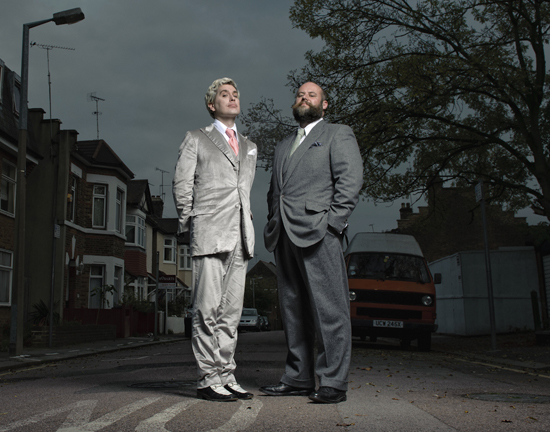As I go about my business in London, it is not uncommon for people to mark upon my dress. "Isn’t your jacket smart!" they cry. "You always look so dapper!" This is very kind of them, but their eyes are mistaken. My attire is merely an ensemble based on what’s left out rather than what I’m actually wearing: I refuse to wear jeans, t-shirt, or trainers, and always try and wear a jacket. My look is essentially 32-year-old Suede fan diving head first into middle age a few years too soon, as evidenced by a splurge on trousers in a Cotswold branch of the Edinburgh Woollen Mill this past weekend.
Compared to Tony Sylvester, butch new frontman of Turbonegro, and Dickon Edwards, London dandy extraordinaire and former member of Orlando, there’s not much between me and the various afternoon thirstymen in The Gate pub, just next to Alexandra Palace station. Edwards, sipping a gin and tonic, wears a silvery grey suit that he was left by the late notorious dandy Sebastian Horsley. As soon as Sylvester (rather warm in a grey flannel three piece suit), sees the buttons on Edwards’ jacket he recognizes the tailor, John Pearse. And so, over the course of our afternoon’s conversation on youth culture, style, suits and subversive tailoring, these two gentlemen from wildly differing aesthetic and musical backgrounds found much to agree on.
Dickon Edwards: Can I point out what I am wearing on my feet? They are Gucci loafers from the 1990s and were left behind by Mark Morrison on one of his video shoots. A friend of mine was working on the video shoot, and like Cinderella, they fitted perfectly!
Tony Sylvester: So you’re wearing Sebastian Horsley’s suit and Mark Morrison’s shoes? You know the first thing I thought to ask to check… [opens Dickon’s jacket to reveal a row of fabric hoops, almost like pen holders, sewn into the lining]
DE: They were for his syringes.
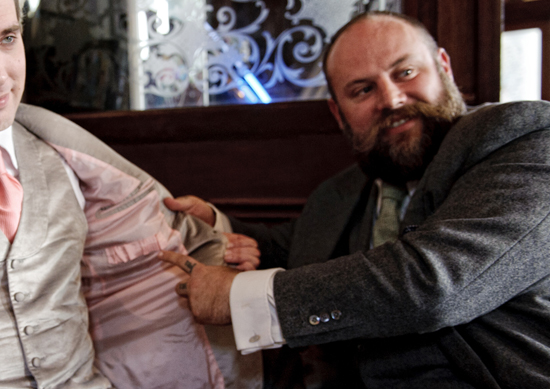
Tony, how did you know it was that suit?
DE: This appeared in his obituary.
TS: John Pearse was Sebastian Horsley’s tailor. I recognized it because of the buttons and because of the cut in general. He owned Granny Takes A Trip, which was the shop on King’s Road where they took military wear and did them in hippy fabric, so he was doing three piece suits in William Morris sofa covering, basically. That was his background. So while he’s a very renowned tailor, everything has that look.
Where did your brooch come from, Dickon?
DE: I ran a club in Camden last year called Against Nature, and that’s where the seahorse comes in. It’s a symbol of the beautiful yet strange.
TS: The animal where the male carries the young.
DE: Exactly. So it’s this idea that the unconventional can be pretty. I was very pleased to learn that a seahorse appeared in the Thames. My shirt is one of Sebastian Horsley’s too. Prince Charles’ tailor did the shirt.
TS: Turnbull & Asser?
DE: That’s it. He knows, you see. So I am wearing Sebastian Horsley’s outfit, Mark Morrison’s shoes, and the brooch is my touch because that’s what I believe in, the idea of being unconventional but beautiful with it. If I have a creed or a belief system, that’s what it is. Beautiful and strange.
What about you Tony, where does your suit come from?
TS: This suit is from Mark Powell, this is a bespoke suit from him. He’s a bit of a dandy, peacock guy from the East End. He used to make all those classic suits that Vic Reeves wore, almost Vincent Price teddy boy meets Hammer horror. He’s a friend and a good raconteur. Unfortunately there’s no great story attached, though my socks are from Turnbull & Asser.
DE: My shirt, and your socks. It says ‘By Appointment To HRH Prince Of Wales’ on mine…
So you have Sebastian Horsley, the Prince of Wales, and Mark Morrison all in one outfit.
DE: That’s what I like about the way that if you’re wearing a suit you’re paying homage to Beau Brummel. We’re talking about this lineage, this continuum, throughout pop music and so on, and that’s why I came dressed like this today, because I thought you’d like the idea of continuing these different stories, passing on different ideas, and different styles. Literally, in my case. I do have tailored suits as well, which are made to measure. The first suits I bought were from charity shops; off the peg, but just fitted me. I suppose some of them must have been dead men’s suits.
TS: This is why I bemoan the state of charity shops now. If you look at the clothes that people are dying in, they’re just not the same. People are dying in clothes that they bought in the 80s and 90s, they’re not dying in the suits that were made from them in the 30s that were then mended and handed down because the quality of clothing has changed so much. It’s almost like the last vestiges of the old quality of bespoke menswear is Savile Row. They’re not doing anything special, they’re just making clothes in the way that clothes used to be made. So now it’s a class thing. Working class people used to have their own suits, just more basic ones, but they were still made for them, and they mended them themselves or took them to a tailor when they got a hole in them. They had one suit, one overcoat, two pairs of boots, the Sunday best and the suit they wore all week. They had expensive clothes, but less of them.
It’s that thing where people turn up on Antiques Roadshow with old sewing machines thinking they’re going to be worth something, but of course they’re not as old sewing machines are two-a-penny – most households had one to repair their clothes.
TS: That’s the thing. There’s a lot to be said for spending money on well-made clothes because it’s an investment that you’re going to keep, they’re going to last, you can get them repaired, say in the way you’ve had those shoes resoled in 15 years, Dickon, two or three times.
DE. Absolutely, the anecdotal value is too good.
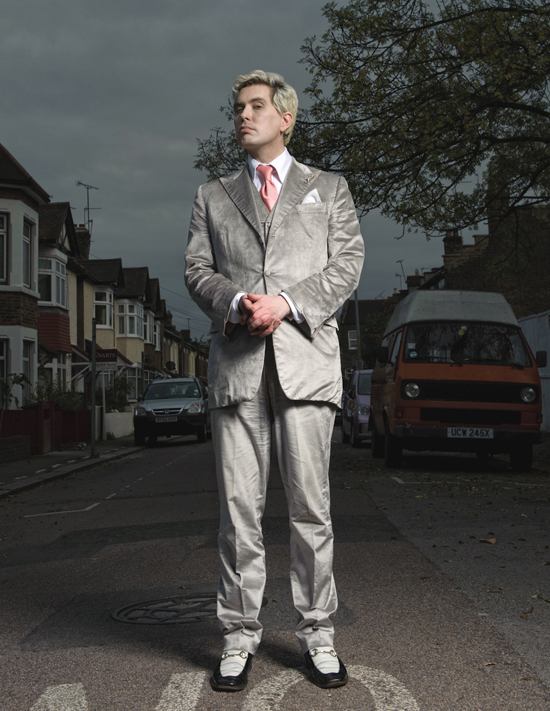
Dickon, I want to talk a bit about the days of Orlando. Romo was very mysterious from the outside of London…
DE: There was a lot of peacockery going on. It was almost a reaction to the Britpop look, which was all Fred Perry and anoraks and Adidas, the Oasis look. You had the Arcadia club, run by the journalist Simon Price, another peacock who dressed more outlandishly than the bands he would write about. Then there was Club Skinny in Camden Lock. These clubs were going in the mid 1990s, and they were a post-New Romantic, pre-Lady Gaga look. It was all very colourful, a lot of makeup going on, feather boas and coloured hair, men wearing nail varnish, and there a few bands which gravitated around this. The music played was things like the New York Dolls, so it was a direct lineage back to that, the original punk rock band that dressed in make-up and colourful, gender-bending clothing. But they also played things like ABC, Soft Cell and Duran Duran. And from that came bands like Plastic Fantastic and Orlando, who were roped into this scene. We were always peacocks by nature, so it was an interesting way of trying to group us. The scene itself was very welcoming in that way. Because the real side of Britpop was this laddishness. Even Fred Perry, which was a look, it did feel very laddy, and not everyone is comfortable with a laddish environment, especially the more dandyish figures. There will always be dandyish figures in music, and they felt more at home in these clubs. It was also very small, a microscene.
I remember reading NME and Melody Maker at the time and there’d be pictures of the clubs and bands like Orlando, but hardly any and you wouldn’t know how to do it for yourself.
TS: It happens online now. Tumblr is magnificent.
DE: It’s the equivalent of the schoolboy or girl’s jotter, which they’d cover in pictures. But now, instead of showing it to their classmates, they show it to the world! A global scrapbook, it’s fantastic. You’re a visual magpie at that age.
TS: I think I still am!
Do you think that with the leveller of the internet, really focused musical subcultures are less likely to happen now?
TS: Yes I think there’s less room for misinterpretation, and misinterpretation and putting your own spin on things is what keeps it evolving. So I mean I’ve definitely seen that in hardcore kids, who all look identical. Once you decide you’re into something you have it all laid out for you already.
DE: They have tumblr, and those fashion blogs where they stop people on the streets. There are so many of them, and people look at those, and they inform each other. The communication between urban hipsters and people who live outside the big cities is so instant now, so they can find out what looks work for them so much quicker.
Did you find during Romo in the 90s that when you went out of London it was instantly different?
DE: That’s a very good point. I think Romo would have been a lot more successful if there’d been the internet. Well, there was the internet, we had a website, but it was very dial-up, before broadband. That was the revolution.
How did your style develop, Dickon?
DE: I’m trying to be myself, in fact. My dad tells me that when I was eight I wouldn’t take my school uniform off when the other boys did. I can’t remember this because I was too young, but he tells me that I would say, ‘Daddy, I want to look smart.’ It’s been in my DNA from an early age. I have always worn a uniform, jackets. I couldn’t wait to get out of shorts. I remember acutely being about seven and eight when you have to wear shorts, then you get to wear trousers when you’re about ten or 11. I’ve never worn shorts since. At the slightest bit of sunshine, British men tend to get their shorts out. I am sure there are people walking around in shorts today.
TS: Oh yes, that Indian summer was everyone having a last gasp. The default setting for your mainstream male is the beach look. It’s the thing I can’t get. Everyone is in combat shorts, a polo shirt, and flip flops. How the fuck can you wear flip flops on a British high street? They’re made for a reason. They’re made for the beach. That’s the long and short of it.
DE: It’s the ‘Mad Dogs and Englishmen’ thing. Or ‘British People In Hot Weather’, by The Fall. They do act in a weird way.
They like to reveal themselves. A strange response to our British fear of nudity.
TS: Brinkmanship or something.
DE: Unsurprisingly I don’t have any beachwear in my wardrobe, but I do have two linen suits. They’re what you’re meant to wear. I loved watching all those Agatha Christie films of British people in the 30s amongst the Pyramids wearing suits. They coped perfectly well.
TS: This is what’s really interesting. I am writing a piece about British colonial wear, and we had all these codes of dressing and stipulations, and suddenly we found ourselves in 40 degree weather around the globe, whatever administrative job we might have in India or South Africa. You still had to turn up in a suit or military uniform, but how the hell do you cope with that? So that’s when you get all the developments in casual wear, like linen and madras. Madras was taking the regimental tartans and weaving them in cotton. Khaki was the same, cavalry drill that was dyed with tea. We had to wear a suit, but it had to be breathable so we didn’t die.
DE: The only problem is you do end up looking like the man from Del Monte.
I must admit I have a pair of formal shorts, but I do like to wear it with a safari shirt that has a high vent up the lower back. I wear brogues with that.
DE: It is hard to pull shorts off properly.
TS: Desert boots, that’s what you want. That’s what they were for.
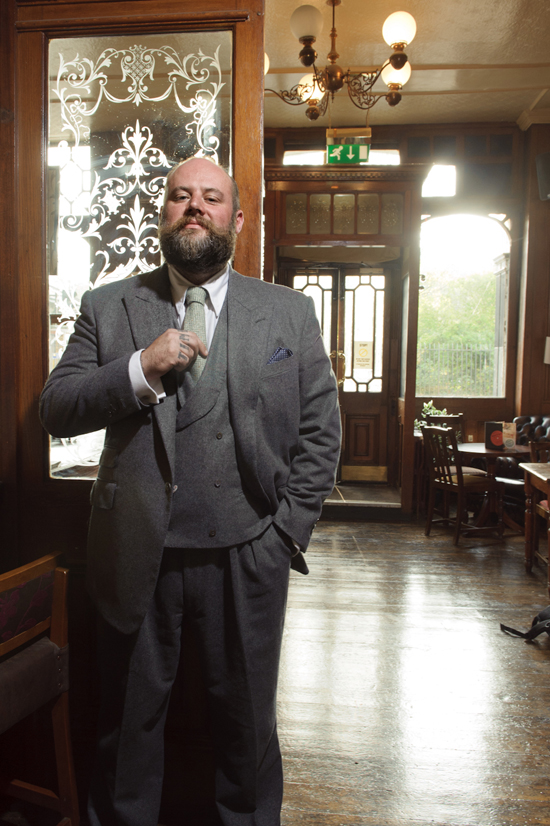
How do you advise approaching the purchase of a good suit?
TS: I would say save your money and buy made to measure. The feeling of it is nothing else, and you know that what you’ve got has been entirely created by you. Obviously I’m not saying go straight to Savile Row, but a Savile Row suit will cost you three or four grand, but it’s had 60 hours of manpower put into it. Now when you ask people what they earn an hour, they say £10 or whatever, well imagine if you worked for 60 hours on something, and then see how much that suit is. They think of it like the superbrands, like an Armani or Versace, which of course is the same price but has been made in China and has had a vast marketing budget put on it. But really, proper British tailoring is the last bastion of artisan, heritage production.
DE: I would also say get your shirts tailored as well. The best experience I’ve ever had with clothing is when I had my first tailored shirt.
TS: If you’re trying to create your own look what could be more personal than getting your own suit made? I’m not saying go and get 20 suits, you won’t be able to, but save up for a year and do it. Get a second job, go on, work in a bar, put a bit of effort in. You bet your life if you spend a thousand pounds on a suit that nothing’s happening to it, you won’t spill anything on it, you ain’t going to out on the razz and rip it. It’ll change the way you carry yourself.
I could have bought myself an incredible suit with the amount I’ve wasted on poorly made clothes.
TS: That’s what it comes down to. It’s a cultural imperative that’s absolutely reversed. Instead of us manufacturing things in this country and having factories where people are paid a decent wage to manufacture things that are sold for a decent amount of money, and because they’re expensive people actually cherish them and have them and mend them and have them all their lives, it’s completely the opposite. Everyone wants very cheap stuff which is made badly somewhere else, which has then put everyone in this country out of business, so then those factory spaces have been turned into self-storage units for people who have got too much crap in their lives. The whole idea of people going out to Primark and buying an outfit for £30 for Saturday night is anathema to me.
Which is why I like TK Maxx. You can get a William Hunt jacket like this for £60, reduced from £500…
TS: I love TK Maxx.

Let’s think about the limitations of dressing well. Dickon, I believe you’ve said you can’t go to music festivals…
DE: It’s so hard to put on a suit in a tent where you can’t stand up. I went to Latitude, which is pretty posh, but unless you get one of those tents where you can stand up, well you can’t put on a suit lying down! You have to go outside, and everyone can see you, it’s terrible. Festivals do not suit the suit wearer.
TS: This is one of the reasons I love Supersonic. It’s a festival, but there’s solid ground underfoot, and you have a roof overhead. All that civilised behaviour, you don’t have to crap in a portaloo and you don’t have to eat that muck.
DE: It’s like you were saying about beachwear in cities. British people love this idea of going to campsites and watching bands. Why? Cities have venues with walls and roofs and so on!
TS: Where you can see the bands and actually hear them.
DE: There are so many festivals. It’s this weird, loveable part of the British psyche where they feel the need to go out there, take a tent, go camping, and find the worst toilet possible.
TS: One of the things that’s developed is that very laddy thing of either going in drag or dressing in something funny with your mates. I remember one year at Supersonic there were a bunch of lads who’d done that… it’s not that kind of festival. But now there’s the Vintage at Goodwood where you can find a tent to get changed into a suit, the music is geared towards the 30s, 40s, 50s. I think they’re trying to create this whole thing of a festival for people who don’t like festivals.
I am a bit wary of this vintage culture, pretending it’s the 1940s. Why would you wish it was the 1940s? It seems like it’s a lot of posh people getting excited about a very dubious time.
DE: They do actually sing Jerusalem at these things.
TS: I think the biggest crime you can do is to look like you’re wearing fancy dress when you dress up. I think you’ve failed if there’s not a naturalism to it, which is probably where we completely diverge.
DE: No, I’m often accused of wearing fancy dress…
TS: …but you can tell with you, because it’s not like you’ve gone, ‘I’m going to look like a jockey from 1910’, you can tell it’s your character.
DE: Yes, this suit was given to me by Sebastian’s girlfriend because she knew how I liked to dress.
TS: I’m only jealous.
DE: I was actually a zombie on Shaun Of The Dead. The email said ‘turn up in your worst clothing’ because they were going to cover us in blood and gore. So I turned up in, well I don’t have t-shirt and jeans, but I found my cheapest suit trousers and a shirt. But the wardrobe department at this mass of people picked some out and gave them costumes, and they took me aside and said ‘yes you look like the sort of person who should be in a suit and tie’. In my case it’s not about joining a club, it’s who I am genetically. That’s very personal to me, and you have to factor that in. The idea of it being fancy dress is almost offensive.
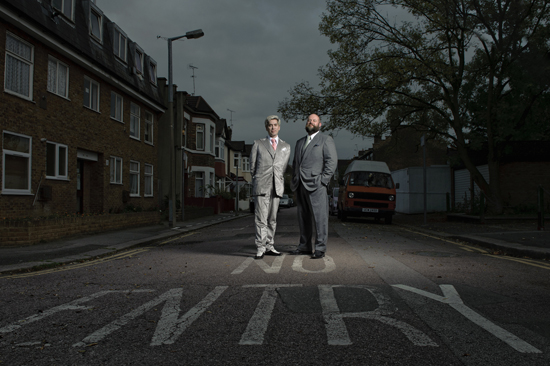
Turbonegro play the Supersonic Festival in Birmingham this weekend. Dickon Edwards can be found about the town. Al Overdrive’s website is here

